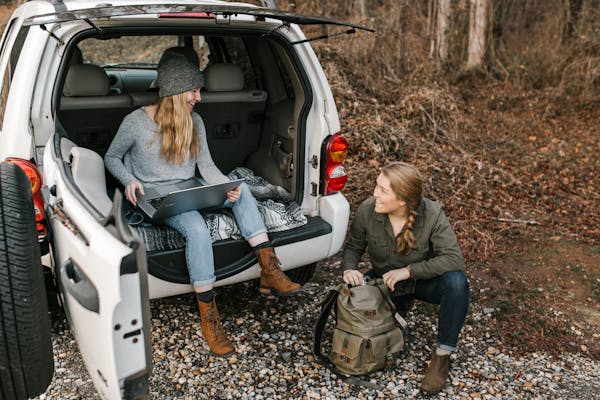Advertorial
Contrary to the traditional way of study, combining education with traveling might sound uncommon, but it’s a trend that more students and learners do when they want to challenge themselves. It’s based on a combination of education and various extracurricular activities, where learning dynamics are different from the traditional experience of sitting in a classroom.
Benefits of studying while traveling
1. Cultural immersion and language acquisition
A traveling student's greatest privilege is being involved in diverse cultures and learning different languages. Involving yourself in cultural activities is an effective means to gain first-hand insight into ethnicity and traditions. It’s a chance to learn new languages, interact with new people, and forge memorable experiences.
Thus, if you happen to be overwhelmed by academic assignments during this encounter, you can ask for assistance from EssayShark writers, professionals with rich knowledge of different topics. You can also enjoy learning new cultures and languages.
2. Real-world application of knowledge
Textbooks and lectures generally introduce you to the knowledge. Still, when this knowledge is applied in a real-world setting, you experience a different and better learning method than the traditional classroom method. By coupling the academic journey with traveling, you’ll see theories being applied, giving you a clear and deeper understanding of the concept and bringing out its values in different places on Earth.
3. Personal growth and self-discovery
Traveling while studying enriches education and provides numerous opportunities to holistically develop the self and sense of identity. Living beyond your comfort zone, finding a way to cope in a strange environment, and meeting people from different cultural backgrounds may be stressful. Still, these are valuable lessons in that they develop resilience, empathy, and adaptability, which are vital academically and in life.
Planning your study-travel experience
1. Setting clear academic goals
Before going on a study-travel journey, it’s essential to determine your academic objectives—will you improve your skills in a particular subject or study the differences between cultures worldwide?
Whether you aim to acquire fresh knowledge about a particular field, pursue innovative pursuits in your area of interest, or meet academic requirements, keeping your objectives in mind would lead you to select a program that suits you best and create an itinerary accordingly.
2. Budgeting and expense control
Figure out the budget for tuition, trip fees, lodging, food, and any emergencies. As you contemplate a study-travel experience, do your homework on scholarships, financial aid plans, and pocket-friendly strategies that will make your budgeting feasible.
3. Considering logistical aspects
Logistics don’t disappear during your study-travel period; it becomes more complicated, which calls for your readiness and preoccupation.
Search for the housing options near your destination, and rent the one that’s safe and easy to study. Check into transport services of the given destination, like metros, air services, rental bikes, etc., and even if there are trip and tour arrangements within the area.
Make the most out of academic and travel activities while keeping unscheduled activities to a minimum so you do not miss out on unexpected discoveries during the trip.
Choosing the right study-travel program
1. Academic considerations
When deciding on a study-abroad program, prioritize academic quality and subject matter. Ensure the program has courses or activities that fit your areas of interest and objectives.
If there are specific instructors you would like to follow or learn from, you must check their qualifications and certified status. Bearing this in mind, the program choice ultimately depends on whether it adheres to standard education.
2. Cultural immersion opportunities
Look for a program that promotes studying abroad with a cultural immersion method and practical execution. Factors to keep in mind include opportunities for homestay with sightseeing and language immersion activities for cultural learning and community engagements.
3. Testimonials and reviews from past participants
Beforehand, ask fellow students, friends, or even seniors who have been in the program for feedback. Their reviews will be your guide and a pretty accurate source of information. Firsthand experience can provide helpful information regarding the validity of its worth and how well it succeeds in its mission by looking directly into the program. Concentrate on issues like learning complexity, cultural immersion opportunities, the organization of a program, and the degree of student satisfaction.
Tips on navigating a successful study-travel adventure
1. Time management strategies
When traveling and studying, the two become inseparably conjoined processes; thus, time management becomes a vital issue. Think about developing a study plan with a regular study slot each day so that your free time will allow you to discover a new place without missing any academic output.
Apply the Pomodoro Technique or time-blocking, two effective methods of optimizing productivity during class sessions as one student.
2. Balancing academic workload and travel activities
Make sure that you don’t only pursue academic undertakings but also put a value on the amount of experience you can get out of your trip. Try to prioritize your tasks and have a dose of ambition.
Set aside specific hours for studying and researching and ensure that both are given equal importance to avoid sabotaging each other. Be sure to put some time aside for your mental and physical recovery to avoid getting burned out and, thus, stay in good health.
3. Staying organized while on the road
It’s essential to track crucial dates such as ticket bookings, due dates, exams, and class attendance through a digital or the old-style paper planner. Take advantage of the travel apps to help manage and organize your itinerary. Also, don't forget to book accommodations and transport arrangements beforehand. Arranging your study materials and planning specific schedules would help reduce stress during the study-travel period, and you’ll be more likely to enjoy the new experience.
Embrace the journey: Uniting learning and exploration
In blending study and travel, many benefits await: exposure to ethnic diversity, academic excellence, and personal development. Thus, you’re encouraged to create and embrace your journey.
Additionally, remember your study-travel legacy, a passage immersed in the multi-potential to become the most transformative time in your life. Allow the world to become your classroom, cherish each stop as a lesson, and always consider every new episode a discovery.





